
 n our previous post, we asked the question that supersedes all others: What does it take to be right with God? The answer, as established in God's Word, is straightforward and consistent throughout: to be of the same glory as God Himself—holy, pure, perfect.
n our previous post, we asked the question that supersedes all others: What does it take to be right with God? The answer, as established in God's Word, is straightforward and consistent throughout: to be of the same glory as God Himself—holy, pure, perfect.This is ominous for all of us, because in our flesh we are inherently incapable of such perfection. But the most glorious of all biblical truths is that such a requirement need not spell our certain doom, because God has made possible the provision of Christ's righteousness to the penitent and believing sinner. Through the process known as imputation, the Bible tells how the repentant believer's sins can be exchanged for Christ's righteousness as a pauper might be redressed from his soiled garment into a pure and spotless robe.
That is the only manner by which the sinner might stand acceptable before God. And although the rebellious heart of sinners yearns for any mode of spiritual dress other than the one stipulated by God, the Bible makes clear that all such endeavors are vain, despicable and worthless substitutes.
God's Dress Code Under Attack
Now, we might expect those who reject outright the God of the Bible to formulate their own manner of acceptable dress before God—as it were, to clothe themselves in their own "righteous" works. But are you aware that God's singular manner of reconciling believing sinners by applying to them Christ's righteous robe is under attack from within the church as well? N.T. Wright—a darling among the revisionist evangelical set—has lead this attack in recent years. His so-called "New Perspective" on the gospel seeks to undermine the traditional, orthodox understanding of God's plan of salvation in several ways, including his claim that God never meant that Christ's righteousness could somehow be imputed to sinners. Wright is derisive of such an idea, claiming this doctrine is a misunderstanding of the gospel. He writes, "In certain circles within the church . . . 'the gospel' is supposed to be a description of how people get saved; of the theological mechanism whereby, in some people's language, Christ takes our sin and we his righteousness." [N.T. Wright, What Saint Paul Really Said: Was Paul of Tarsus the Real Founder of Christianity? (Grand Rapids: Eerdmans, 1997), p. 39.]

Wright is insistent that this traditional Reformed understanding of the gospel involving penal substitutionary atonement has it all wrong. "This is not the gospel," he writes in his latest book, The Day the Revolution Began. "This is paganism. To worship God as one who justifies by imputation is nonsense." So as to leave no question on his denial of penal substitutionary atonement, he adds: "That Christ died in the place of sinners is closer to the pagan idea of an angry deity being pacified by a human death than it is to anything in either Israel's Scriptures or the New Testament." [N.T. Wright, The Day the Revolution Began: Reconsidering the Meaning of Jesus' Crucifixion (New York: Harper One, 2017), p. 147.]
Elsewhere he writes: "If we use the language of the law court, it makes no sense whatsoever to say that the judge imputes, imparts, bequeaths, conveys, or otherwise transfers his righteousness to either the plaintiff or the defendant. Righteousness is not an object, a substance, or a gas which can be passed across the courtroom. This gives the impression of a legal transaction, a cold piece of business, almost a trick of thought performed by a God who is logical and correct, but hardly one we want to worship." [Wright, What Saint Paul Really Said, p. 113.]
And what is his alternative? Wright contends that no one is justified—in other words, declared righteous by God—until one's final, future assessment. At that time—according to Wright—what the Apostle Paul meant as present justification by faith will be affirmed or denied on the basis of one's entire life. [Ibid, p. 129.] Wright speaks of a person's "covenant faithfulness," wherein one maintains membership in God's covenant with His followers through vocational means (i.e. through obedience to His teaching), and anticipates a final justification at the end of time based at least partly in these obedient works. As Phil Johnson has remarked, this makes a person's faithful discipleship a factor in final justification. In other words, Wright's theology would ground ultimate salvation at least partly in the believer's activity while on Earth (Wright describes this as the "covenant of vocation"), and not completely in the finished work of Christ on the sinner's behalf. [Phil Johnson, "What's Wrong with Wright?" Ligonier Ministries.]
Wright's purpose is to re-envision the traditional gospel away from its insistence on repentance and faith in God's substitutionary atoning sacrifice in exchange for God's imprimatur of righteousness. Instead, Wright would have us believe that all who dedicate themselves to Christ and follow-through with behaviors consistent with His ethics are in God's family and belong at His table. The late philosopher and author Dallas Willard (another favorite among revisionist evangelicals) would seem to concur when he remarks, "It isn't that we become righteous by having the correct beliefs. We become righteous by trusting God and living from Him." [Dallas Willard, interview with John Ortberg, Menlo Park Presbyterian Church, Menlo Park, CA, Dec. 13, 2009.] In the same interview, Willard declares it is a mistake to think that "God has a list of things you must believe, and then He'll have to let you into heaven." [Ibid.]
Jesus: Heaven's Dress Code Enforcer
So which are we to believe? Is the gospel the imputation of Christ's righteousness in the form of a holy robe to all who repent and (in Willard's sardonic lexicon) "believe the right things," or is it Wright's version of covenant membership that comes to all would-be disciples of Christ as they live out their faith in obedience to His teaching?" Does the Bible provide any insight on this critical divide?
Indeed it does, and from no less an expert than Jesus Christ Himself. In Matthew 22:1-14, Jesus tells a parable to His disciples, the ending of which addresses this exact issue. At a banquet meant to represent the eternal celebration between God and His true companions, Jesus tells of someone God deems unacceptable at the feast—an unwelcome intruder. In an astonishing turn of events, this impostor is confronted by the King, the Lord Jesus Christ, and summarily tossed from the banquet into outer darkness, a figurative description for hell.
 For what crime? The King Himself had declared that invitations were to be sent far and wide, to whomever could be found (v. 9). Not only that, invitations were sent out without regard to one's moral standing (v. 10); in fact, the event was to include (v. 10) "both bad and good." The man is at the banquet when confronted by the Lord, implying his intention to participate in the communal gathering. Ostensibly he is there on the basis of fulfilling his part in a "covenant of vocation" while on Earth. There is no mention of any obvious treachery, and his presence at the banquet would presume at least an outward demonstration of allegiance to the King. None of his fellow celebrants seem to have any inclination that the man's admission to the event was illegitimate.
For what crime? The King Himself had declared that invitations were to be sent far and wide, to whomever could be found (v. 9). Not only that, invitations were sent out without regard to one's moral standing (v. 10); in fact, the event was to include (v. 10) "both bad and good." The man is at the banquet when confronted by the Lord, implying his intention to participate in the communal gathering. Ostensibly he is there on the basis of fulfilling his part in a "covenant of vocation" while on Earth. There is no mention of any obvious treachery, and his presence at the banquet would presume at least an outward demonstration of allegiance to the King. None of his fellow celebrants seem to have any inclination that the man's admission to the event was illegitimate.So why did Christ throw him out of the celebration and into hell? For one reason alone. In the midst of the celebration, Christ discovers the man and asks him a single question (v. 12-13): "'Friend, how did you get in here without a wedding garment?' And he was speechless. Then the king said to the attendants, 'Bind him hand and foot and cast him into the outer darkness. In that place there will be weeping and gnashing of teeth.'"
This is most extraordinary. Jesus confronts a would-be disciple and fellow celebrant at His kingdom celebration and forth-with tosses him into hell for violating the dress code! Jesus is saying that whether or not you are wearing the proper wedding garb in His presence will determine whether you celebrate with Him forever, or whether He orders you cast into hell. Jesus' words leave no doubt as to His implication: no matter what, it is vital to be found wearing the proper wedding garment in the presence of God!
So let's take Christ's teaching and apply it to what we have already learned. From the Scriptures referenced in the previous post, we can deduce: (1) the wedding dress Christ requires comes entirely through the initiative and activity of God (Isa. 61:10); (2) the process includes the removal of the soiled garment of the sinner in exchange for the righteous robe (Zech. 3:4); and (3) the event must occur prior to one's meeting with the Lord Himself (Matt. 22:11-13).
 Compare this with Wright. On all three measures, Wright's theology misses the mark. How so? (1) His ideas would introduce a disciple's faithful obedience as a factor in determining his acceptance before God, in violation of Isaiah 61:10. (2) Wright's theology minimizes or negates altogether the gospel's insistence on a specific garment exchange which serves to cleanse the sinner's stained nature, in violation of Zechariah 3:4. Finally, (3) Wright insists that no one will be justified, or declared righteous—including, by analogy, wearing any robe of righteousness—until he reaches Heaven. This perspective dismisses outright any prerequisite dress code that must be applied prior to the afterlife and one's ultimate encounter with Lord Jesus Christ, in clear violation of the Lord's own teaching in Matt. 22:11-13. On all three accounts, Wright's ideas oppose the distinct and indisputable instruction of the Word of God.
Compare this with Wright. On all three measures, Wright's theology misses the mark. How so? (1) His ideas would introduce a disciple's faithful obedience as a factor in determining his acceptance before God, in violation of Isaiah 61:10. (2) Wright's theology minimizes or negates altogether the gospel's insistence on a specific garment exchange which serves to cleanse the sinner's stained nature, in violation of Zechariah 3:4. Finally, (3) Wright insists that no one will be justified, or declared righteous—including, by analogy, wearing any robe of righteousness—until he reaches Heaven. This perspective dismisses outright any prerequisite dress code that must be applied prior to the afterlife and one's ultimate encounter with Lord Jesus Christ, in clear violation of the Lord's own teaching in Matt. 22:11-13. On all three accounts, Wright's ideas oppose the distinct and indisputable instruction of the Word of God.Conclusion: What Are You Wearing?
Make no mistake. Whether they recognize it or not, those who tamper with the Bible's wondrous and clear presentation of God's provision of a holy garment to penitent believers, through Christ's penal substitutionary atonement, do so from the corruption and pride of their carnal selves. It arises from the age-old, grotesque desire to offer up some form of human activity designed to merit God's acceptance. These would-be spiritual leaders and religious teachers resent God's impossible righteous standard, so they devise one of their own. Here, Proverbs 14:9 applies: "Fools mock at the guilt offering, but the upright enjoy acceptance." Those who dislike God's bar of approval will mock at what He has done to reconcile repentant and believing sinners to Himself. But rather than enjoying God's acceptance, they are counted as fools.
Why do such fools mock in this way? Ultimately, it is because they do not want to share in the persecution Christ says will come to His true followers (Gal. 6:12; see also John 15:18-25; 16:1-4; 2 Tim. 3:12; 1 John 3:13). Those who deny the doctrine of substitutionary atonement do so to avoid telling sinners they have neither the autonomous will nor ability to merit any favor of God (Phil. 2:12), that they live under God's contemporary judgment even now (John 3:18, 36; Gal. 3:10), and that apart from faith in Christ's Person and saving work, they are headed for eternal punishment (Matt. 25:46; John 8:24). That is exclusive, divisive, even inflammatory language, and those who deny the true gospel message want no part in such polemical discourse that might invite rejection and open hostility.

But such a polemic is precisely the intent of the true gospel, which is why Christ is depicted in both the Old and New Testaments as a "rock of offense" (Isa. 8:14; Rom. 9:33; 1 Pet. 2:8). The gospel is a polemical message designed to convict the sinner of damning sin and the utter ineptitude of any self-rescue. If humans, through their estimable efforts, can affect their standing before God, then these modern-day evangelical revisionists can appeal to the pride of humans in presenting their good deeds before God, and maintain their popular standing among like-minded objectors. But none of this is new. These latest attempts to undermine God's righteous standard are but recycled heresies which, regardless of the age or form, are subject to the same chilling and dire sentence Christ gave to the improperly-clothed wedding celebrant.
N.T. Wright, Dallas Willard and all who follow in their wake are wrong. Heaven has a dress code, and it is strictly enforced. The robe of righteousness that must be worn in the presence of Christ has no input from human hands, comes through the imputation of Christ's righteousness in exchange for the penitent believer's sins, and must be applied by Christ alone prior to the one's progression to the afterlife. This is the clear statement of Scripture. May God continue to call forth an army of righteously robed converts to proclaim His true gospel, and to rebuke all assaults against it.
Dr. Colin L. Eakin
Guest Contributor
|

 Dr. Eakin is a sports medicine orthopædic surgeon in the Bay Area and part time teacher at Grace Bible Fellowship Church's Stanford campus ministry. He is the author of
Dr. Eakin is a sports medicine orthopædic surgeon in the Bay Area and part time teacher at Grace Bible Fellowship Church's Stanford campus ministry. He is the author of 
 hat does it take to be right with God? That is the central question of human existence. What are God's criteria for eternal life with Him? What does He require?
hat does it take to be right with God? That is the central question of human existence. What are God's criteria for eternal life with Him? What does He require?
 But the prideful human heart is wired to reject God's offer of Christ's righteous robe, and to come up with one of its own. Ever since Adam and Eve made garments of leaves in the vain attempt to cover the shame brought on by their sin, it has been mankind's nature to reject the covering God would apply, and endeavor instead to apply an alternative. This, in fact, is the impetus behind every false religion. Every false form of belief in the world is predicated, at its core, upon developing some alternative garment that might cover the sin and shame of its converts and somehow still allow them to stand acceptable before God.
But the prideful human heart is wired to reject God's offer of Christ's righteous robe, and to come up with one of its own. Ever since Adam and Eve made garments of leaves in the vain attempt to cover the shame brought on by their sin, it has been mankind's nature to reject the covering God would apply, and endeavor instead to apply an alternative. This, in fact, is the impetus behind every false religion. Every false form of belief in the world is predicated, at its core, upon developing some alternative garment that might cover the sin and shame of its converts and somehow still allow them to stand acceptable before God.
 y friend and one-time joint pastor of
y friend and one-time joint pastor of 


 nless you have been living in seclusion somewhere, you will have noticed that a radical putsch is currently underway to get evangelicals on board with doctrines borrowed from Black Liberation Theology, Critical Race Theory, Intersectional Feminism, and other ideologies that are currently stylish in the left-leaning secular academy. All of these things are being aggressively promoted in the name of "racial reconciliation."
nless you have been living in seclusion somewhere, you will have noticed that a radical putsch is currently underway to get evangelicals on board with doctrines borrowed from Black Liberation Theology, Critical Race Theory, Intersectional Feminism, and other ideologies that are currently stylish in the left-leaning secular academy. All of these things are being aggressively promoted in the name of "racial reconciliation." 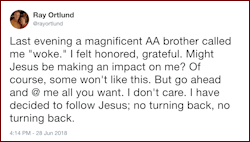
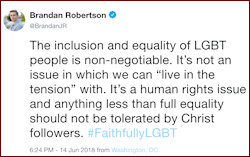

 ead this:
ead this: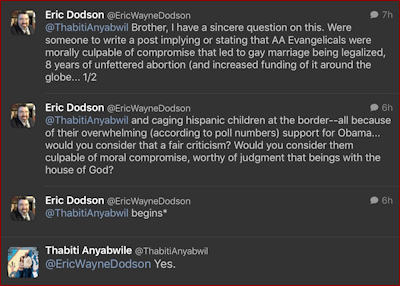
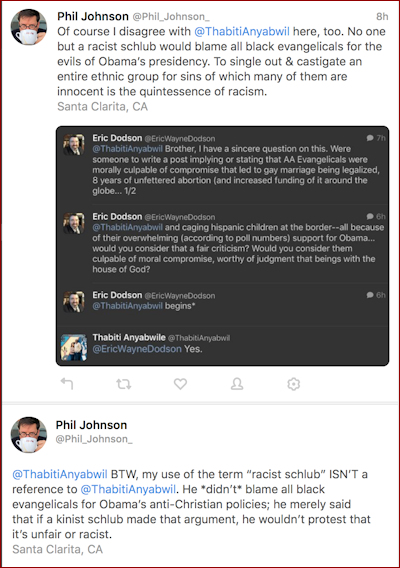

 egarding the previous post, let me underscore my answer to an objection that keeps coming up. One of my critics on Twitter stated it as succinctly as anyone. He wrote, "Attraction and lust aren't the same thing. [Therefore] your proposition collapses entirely."
egarding the previous post, let me underscore my answer to an objection that keeps coming up. One of my critics on Twitter stated it as succinctly as anyone. He wrote, "Attraction and lust aren't the same thing. [Therefore] your proposition collapses entirely."

 ull disclosure: Here is the development that finally provoked my sense of consecrated indignation enough to motivate me to start blogging again:
ull disclosure: Here is the development that finally provoked my sense of consecrated indignation enough to motivate me to start blogging again:
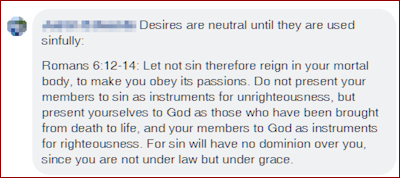
 Yes, all of us struggle with evil desires. That's part of our fallenness. Even Paul struggled with covetousness—evil desire (Romans 7:7-25). But Paul's whole point was that those desires (even if never acted on) are sins to be mortified, not prize ribbons to be worn as badges of one's identity.
Yes, all of us struggle with evil desires. That's part of our fallenness. Even Paul struggled with covetousness—evil desire (Romans 7:7-25). But Paul's whole point was that those desires (even if never acted on) are sins to be mortified, not prize ribbons to be worn as badges of one's identity.
 he issue underlying practically every popular evangelical trend we have ever decried here on
he issue underlying practically every popular evangelical trend we have ever decried here on  Christians are expressly forbidden to embrace the world's values or seek its approval: "Do not love the world or the things in the world. If anyone loves the world, the love of the Father is not in him. For all that is in the world--the desires of the flesh and the desires of the eyes and pride in possessions--is not from the Father but is from the world. And the world is passing away along with its desires, but whoever does the will of God abides forever" (1 John 2:15-17).
Christians are expressly forbidden to embrace the world's values or seek its approval: "Do not love the world or the things in the world. If anyone loves the world, the love of the Father is not in him. For all that is in the world--the desires of the flesh and the desires of the eyes and pride in possessions--is not from the Father but is from the world. And the world is passing away along with its desires, but whoever does the will of God abides forever" (1 John 2:15-17). The notion that we must win the world's esteem before the gospel can do its work is, I'm convinced, a spiritually crippling error. But it's also the presupposition underlying most of the trends currently vying for widespread acceptance within the so-called evangelical movement. In reality, for three decades or longer the broad movement has been softening its commitment to (and in many cases totally abandoning) the two most important evangelical convictions—sola Scriptura and sola fide. Those cardinal biblical doctrines are now being replaced by secular dogmas: "wokeness," "social justice" (a liberal counterfeit, not biblical justice), critical race theory, gender fluidity, and an ever-increasing number of ideologies bred and popularized in secular academic circles.
The notion that we must win the world's esteem before the gospel can do its work is, I'm convinced, a spiritually crippling error. But it's also the presupposition underlying most of the trends currently vying for widespread acceptance within the so-called evangelical movement. In reality, for three decades or longer the broad movement has been softening its commitment to (and in many cases totally abandoning) the two most important evangelical convictions—sola Scriptura and sola fide. Those cardinal biblical doctrines are now being replaced by secular dogmas: "wokeness," "social justice" (a liberal counterfeit, not biblical justice), critical race theory, gender fluidity, and an ever-increasing number of ideologies bred and popularized in secular academic circles.
 t's been more than six years since I retired from the blogosphere. For half a decade, whenever someone would ask if I missed blogging, my honest answer was, "Not at all. Never even once." There wasn't a single moment in all those years when I thought, I wish I were still blogging so I could write something more than a Tweet about this issue. In my seven years of blogging, I had posted on practically every issue I really cared about. I ran out of opinions.
t's been more than six years since I retired from the blogosphere. For half a decade, whenever someone would ask if I missed blogging, my honest answer was, "Not at all. Never even once." There wasn't a single moment in all those years when I thought, I wish I were still blogging so I could write something more than a Tweet about this issue. In my seven years of blogging, I had posted on practically every issue I really cared about. I ran out of opinions. I had tried posting some opinions in the comments sections of a couple of popular blogs, but they made it clear they were not interested in dissenting views. One famous blog closed their comments completely when I tried joining their discussion. So
I had tried posting some opinions in the comments sections of a couple of popular blogs, but they made it clear they were not interested in dissenting views. One famous blog closed their comments completely when I tried joining their discussion. So 

 I suddenly have the itch to write about some of these things. Not every day, of course, but from time to time—perhaps weekly or so. Dan Phillips is now blogging to a bigger audience
I suddenly have the itch to write about some of these things. Not every day, of course, but from time to time—perhaps weekly or so. Dan Phillips is now blogging to a bigger audience 








